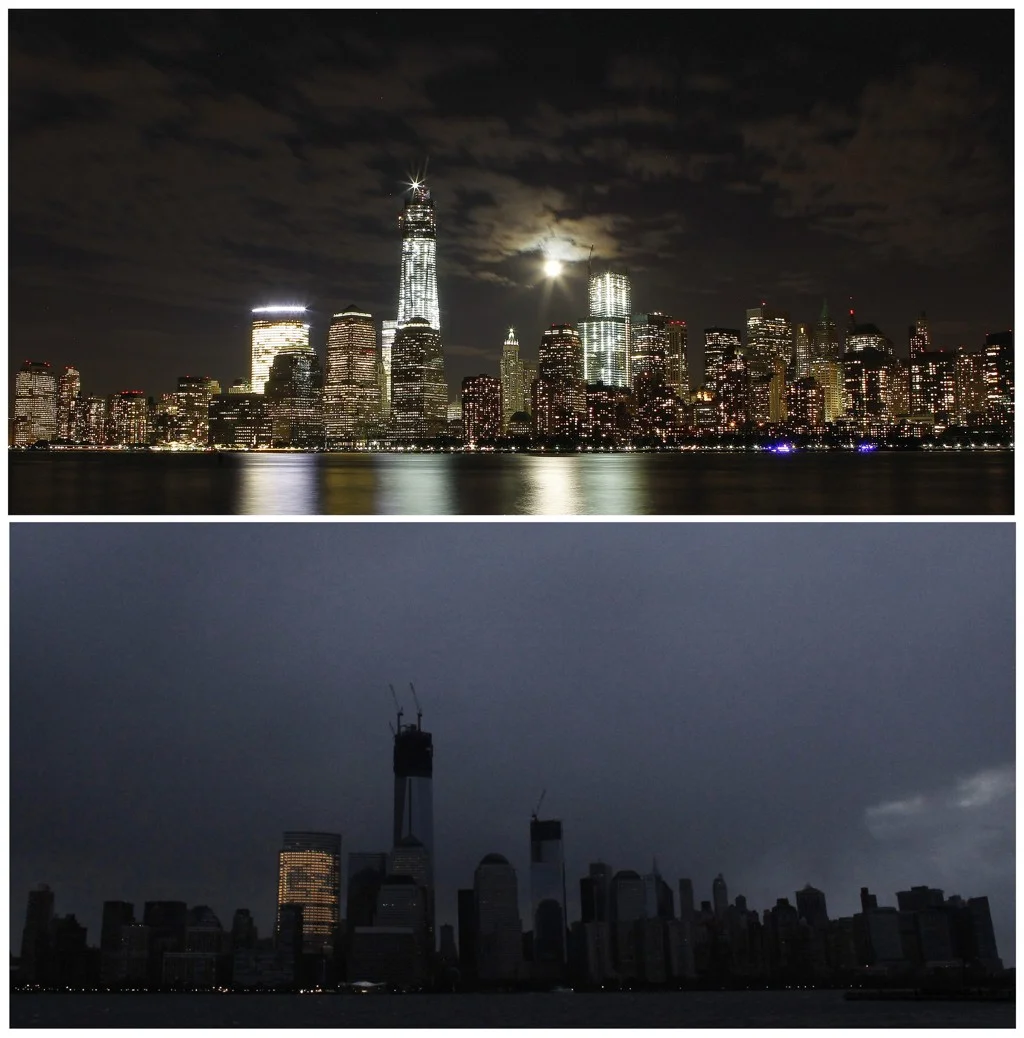Hurricane Sandy came and went. While I escaped the storm safe and sound, some of my friends and family were not so lucky. Many are still without power, some experienced flooding, and two had extensive damage to their property.
Walking around New York City post-Sandy was surreal. Above 40th street, New York felt like Metropolis under the watchful eye of Superman with folks brunching and kids trick-or-treating. Below 40th, it was Gotham City under the occupation of Bane with limited resources and a crumbling infrastructure.
REUTERS/Gary Hershorn/Eduardo Munoz, Lower Manhattan before and after Hurricane Sandy, via Washington Post.
Yet, despite these horrible conditions, New Yorkers across the city rallied around each other, shared what they had, and reached out to those who couldn't help themselves.
We've seen this before, both in science fiction and reality. In this summer's The Dark Knight Rises, Gothamites came together to fight the brutal forces of Bane. A similar phenomenon was observed in the real Gotham City post 9/11/2001 - New Yorkers put their differences aside to ensure their neighbors were safe.
A major theme in the Dark Knight trilogy is the rise of Gothamites from an apathetic population to one that takes responsibility for its city.
Psychologists Christopher Peterson (who sadly passed away last month) and Martin Seligman, pioneers in the field of positive psychology, investigated this exact observation in a 2003 study. Peterson and Seligman used the Values in Action (VIA) Classification of Strengths (you can take it yourself here), a scientific assessment of positive traits that exist across cultures, to determine if New Yorkers were experiencing a change in character strengths before and after the events of 9/11. What they found was post 9/11, the character strengths of gratitude, hope, kindness, leadership, love, spirituality, and teamwork had significantly increased. Furthermore, these strengths remained elevated 10 months after the attacks.
What is going on here? The authors provide the following explanation:
In the immediate aftermath of September 11, people behaved differently by turning to others, which in turn changed their social worlds so that the relevant behaviors were rewarded and thus maintained.
In other words, following 9/11 people were more likely to help each other, which in turn reinforced altruistic character strengths in the short and long term.
While there are some problems with Peterson and Seligman's 2003 study (it was cross sectional, not longitudinal, and could suffer from a sampling bias), it did empirically demonstrate a trend that is often observed in the aftermath of traumatic events - people help each other.
The murder of Kitty Genovese, and the ironic myth of bystandard apathy in her case, ignited research in the field of altruism.
But why does this happen? We know from social psychology that individuals are more likely to engage in altruism if they:
- See a situation as an emergency.
- Feel personal responsibility to the other person (i.e. don't see themselves as a bystander).
- Have the ability to plan and implement a course of action.
Given the above, it's likely that in these large scale disasters, most individuals feel an increased personal responsibility to their neighbors, friends, and relatives. Additionally, seeing news, blogs, photos, and tweets about the disaster increases a sense of urgency while reports of locals helping each other shows us how we can provide assistance.
Living in a part of NYC that had power this week, I did feel a personal responsibility to provide refuge to friends who were not as fortunate. However, that responsibility only developed after reading about their suffering through Facebook updates. When displaced friends did come over, it felt good to help them (altruism is highly reinforcing).
Peter Foley returned to Gotham's aid because of a sense of responsibility to his friend.
Getting back to The Dark Knight Rises, when Bane created a sense of emergency it was through teamwork and collective responsibility that Gotham rose against him. Bruce Wayne returned as Batman only after John Blake and Commission Gordon reminded him of his responsibility to protect the city. Later, Commissioner Gordon used a sense of personal responsibility, based upon their past partnership, to convince Peter Foley to stop hiding and assist in the resistance against Bane. The ultimate hero of the Dark Knight trilogy is not Batman, but the citizens of Gotham who finally accepted responsibility for fighting injustice.
While I would never wish a disaster upon anyone, psychology has demonstrated that good things can come out of traumatic events. We can all capitalize upon these findings (e.g. create a sense of urgency, personal responsibility, and describe a course of action) to promote altruism before impending disasters, in their aftermath, and during times of personal crisis.
To learn more about how you can help those affected by Hurricane Sandy, click here for more information.








